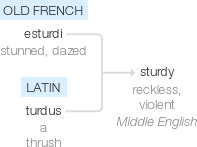Sturdy
Middle English (in the senses ‘reckless, violent’ and ‘intractable, obstinate’): shortening of Old French esturdi ‘stunned, dazed’. The derivation remains obscure; thought by some to be based on Latin turdus ‘a thrush’ (compare with the French phrase soûl comme une grive ‘drunk as a thrush’).
wiktionary
From Middle English sturdy, stourdy, stordy(“bold, valiant, strong, stern, fierce, rebellious”) (perhaps influenced by Middle English sture, stoure, stor(“strong, robust, harsh, stern, violent, fierce, sturdy”); see English stour), from Old French estourdi(“dazed”), form of estourdir, originally “to daze, to make tipsy (almost drunk)” (Modern French étourdir(“to daze, to make tipsy”)), from Vulgar Latin *exturdire. Latin etymology is unclear – presumably it is ex- + turdus(“ thrush (bird)”), but how this should mean “daze” is unclear. [1] A speculative theory is that thrushes eat leftover winery grapes and thus became drunk, but this meets with objections. [2]
Disease in cows and sheep is by extension of sense of “daze”, while sense of “strongly built” is of late 14th century, [1] and relationship to earlier sense is less clear, perhaps from sense of a firm strike (causing a daze) or a strong, violent person.
etymonline
sturdy (adj.)
c. 1300, "hard to manage, reckless, violent," from Old French estordi (11c., Modern French étourdi) "violent," originally "dazed," past participle of estordiir "to daze, stun, stupefy," from Vulgar Latin *exturdire, which some presume to be from Latin intensive prefix ex- + turdus "thrush." Barnhart suggests the notion is of thrushes eating grape remnants at wineries and behaving as if drunk (Italian tordo "thrush" also means "simpleton," and French has the expression soûl comme une grive "drunk as a thrush"). OED, however, regards all this as "open to grave objection." Century Dictionary compares Latin torpidus "dull."
Sense of "solidly built, strong and hardy" first recorded late 14c. Related: Sturdily; sturdiness. Sturdy-boots "obstinate person" is from 1762; a sturdy beggar in old language was one capable of work (c. 1400).
